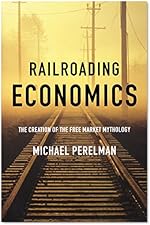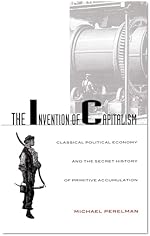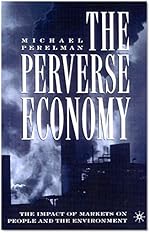Dear Donald Trump. I want to tell you why I (Michael Perelman) am suited to be the secretary of defense.
I’ve been watching your cabinet appointments. You have been choosing people who have shown that they are chosen to manage, with the exception of a large number of generals.
I want to see United States stop joining wars throughout the world. Besides, if you appoint me as secretary of defense, I can save the government billions and billions of dollars freeing money for you to give to your favorite corporations. My work would eventually reduce the worldwide anger regarding the country’s warlike posture. In doing so, I would defend the lives of many people who might follow the experience of the soldiers soon already gone to places like Afghanistan and Iraq. Please call me as soon as possible. Think about it. My plan would lower your taxes.
.
Inhuman humans
The Supreme Court case which supposedly decided to corporations should be treated as human beings never did so, although the Supreme Court clerk who summarized decisions claimed that the court had made such a decision. Not Long ago Frank H. Easterbrook and Daniel R. Fischel, the former a federal judge as well as a senior lecturer at the University of Chicago School of Law, wrote:
It is not true, however, that there is a legal duty to enforce every legal right
…. Managers do not have an ethical duty to obey regulatory laws just because
those laws exist. They must determine the importance of these laws. The
penalties Congress names for disobedience are a measure of how much it
wants firms to sacrifice in order to adhere to the rules: the idea of optimal
sanctions is based on the supposition that managers not only may, but also
should violate the rules when it is profi table to do so. [Easterbrook and
Fischel 1982: 1171 and 1177 n]
Richard Posner, another influential federal judge, who is also a
prolific author and a senior lecturer at the same University of Chicago
School of Law as Fischel, made a similar assertion (Posner 1986).
When Milton Friedman, the University of Chicago colleague of
these legal scholars, had proposed that the only responsibility that
corporations have is the duty to maximize profits without taking any
social concerns into consideration, within the bounds of the law, his
position was controversial. A few decades later, federal judges, along with Milton Friedman, proposed that the obligation to earn profits overrides the law.
During the height of the scandal involving Enron’s multibilliondollar frauds, a Wall Street Journal opinion piece entitled “Corporations Aren’t Criminals” noted: “Under the common law, a corporation could not be guilty of a crime because it could not possess mens rea, a guilty mind” (Baker 2002). Sadly, the author was correct — at least insofar as the current courts are concerned.
The mens rea defense is even stronger than the insanity defense. People judged to be insane often face incarceration while corporations go scot-free, even those that profit from the incarceration of others.
Finally, if corporations are mindless, and do not need to fallow laws, why do they deserve the same rights as good citizens. Oh yes, in a democracy — one dollar one vote.
The inhuman priorities of capitalism.
In this supposedly democratic country, governors in some states have the right to replace local governments with an appointed “emergency manager.”
The cruel behavior of authorities in Flint Michigan who switched the town’s water from Detroit’s water supply to the toxic water of the Flint River threatens the health of the town’s population, especially the youngest among them. Most state officials (with the responsibility for protecting the well-being of the public — with some heroic exceptions) looked the other way.
The purpose of shifting the water supply was to save money, but that will prove to be unrealistic. The backlash from the damage to the public will ultimately cost the town far more than any projected savings.
But, to be fair, the authorities did show some compassion. When they learned that the toxic water was harming automobile parts at a local General Motors Plant, they provided the factory better water – a choice that will cost the city $400,000 a year. Of course, the costs will ultimately fall on the city, which will be unable to cover that cost. No doubt the city will be expected to privatize or sell off its assets, leaving the people of Flint stripped of the rudiments of a livable environment. Only the car parts will escape unscathed from this neoliberal fiasco.
The Essential Handbook for Engineering an Unequal Society, a Manifesto by Corp Dollars
What follows requires an intense dedication to spirit of WEM (The Wondrous Efficiency of Markets).
A Successful Engineer will have to learn to refrain from falling victim to foolish feelings of justice or sympathy, both of which threaten to undermine WEM.
The architecture of inequality must be carefully constructed. As the founding fathers of the United States clearly understood, democracy must be kept in check. For this purpose, they invented the Electoral College to prevent the president from being elected by popular vote.
To ensure an effective electoral system, an obsequious media must be skilled in drowning the public with a flood of misinformation to maintain a constant level of fear to make them more likely to side with the CS (corporate system).
Knowing that the media is not currently up to the job of managing the electoral system, even with a generous flood of money from the CS. In order to protect the WEM, sophisticated methods are required. Gerrymandering almost essential by placing groups of people, too ignorant to understand that WEM, in districts where their votes will be inconsequential.
Now we get to a more important part of the architecture: the legal system. For example, courts in the United States agreed that corporations are people, deserving all the rights of an upstanding citizen. Moreover, the electoral system insurance that the appointment of judges will be restricted to those people who are sincere believers in the WEM. Their role is essential because some legislators get out of hand and create abominable regulations that undermine the efficiency of WEM. Some benighted members of the judiciary are too lackadaisical to rule these regulations as unconstitutional. For that reason, CES must offer very lucrative employment to the regulators who are intelligent enough to see the wisdom of WEM. Consequently they ignore the foolish regulatory structure.
Regulators are not the only ones to see the benefits of working with the CES. Politicians who resign or are defeated are almost inevitably destined to enjoy the benefits of their dedication to the WEM with the returns from taking a rewarding position with a major corporation, lobbying, or even a lucrative contract to write a book that virtually no one would want to read.
When done correctly, this system works magnificently, although it periodically it seems to fall apart until the detested government apparatus rescues it. In the meantime, huge amounts of wealth and income fall into the hands of the top 1%, the people of greatest importance, while the rest of the public can enjoy watching the spectacular performance of the CES, a reward worthy of their place in society especially because envy of the wealthy brethren will obviously make them work harder to succeed, adding to WEM.
All power to WEM!
A Mini-Dictionary of Neoliberalism?
Richard Parker coined the word “neglectorate” to describe the public’s alienation from the current dysfunctional political system. Now that economists have, for the most part relegated John Maynard Keynes to the dustbin of history, the term Dickenysian seems to be appropriate for the present conditions, which are becoming increasingly similar to Charles Dickens’ portrayal of the world he lived in. The power of the bond market in imposing its will on supposedly independent states, suggests that bondage may be appropriate for expressing the power of capital. Finally, we could describe the current economic system as Crapitalism, which treats ordinary people as crap.
Mary Fallon and me
Mary is the governor of Oklahoma. She does not want to comply with the Supreme Court of the state, which ruled that the display of the 10 Commandments must be removed from state property.
Her position is based on her reading of the Constitution. She explained,“You know, there are three branches of our government. You have the Supreme Court, the legislative branch and the people, the people and their ability to vote,” she explained. “So I’m hoping that we can address this issue in the legislative session and let the people of Oklahoma decide.”
Unfortunately, Mary got the three branches confused. Anybody who follows political affairs knows that the three branches are Wall Street, the corporate media, and the 1%.
Keep up good work, Mary.
Negation of the Negation
The frackers in northern Alberta did their part in creating hot and dry conditions that caused 35 fires covering 80,000 acres, which will contribute to the carbon footprint of fracking. Despite 1400 firefighters, only five of the fires had been contained according to a 2 June Wall Street Journal report. Symbolic of the destruction of the supposedly technological breakthrough, this distraction is taking place on Canada’s only strategic bombing site. Bold
The Dysfunctionality of Slavery and Neoliberalism
The Dysfunctionality of Slavery and Neoliberalism
We are all patriotic. Let’s start with the Star Spangled Banner.
You all are familiar with some of it, but perhaps some of you may not know this particular stanza: Don’t worry, I won’t sing it:
“No refuge could save the hireling and slave from the terror of flight, or the gloom of the grave.” Keep in mind that the militias referred to in the Second Amendment seem to have been the groups that hunt down escaped slaves.
The elevation of slave owners’ property rights easily morphed into the expansive property rights of those who hired wage labor. This power allowed capitalists to call upon the state rather than militias of slave captors to keep workers’ rights and wages in check.
This arrangement supposedly served the public interest because low wages mean high profits, which, in turn meant increased investment, which translates into shared prosperity, presumably even including otherwise downtrodden labor — a bourgeois version of the unity of opposites.?php the_content('
Read More
Despite the neoliberal obsession with wage suppression, history suggests that such a policy is self-destructive. Periods of high wages are associated with rapid technological change. For example, after the scourge of the Black Death, which eliminated about a third of the population of Europe, the surviving workers were in a better bargaining position in terms of both wages earned and rents paid. Rapid technological change emerged as a means to cope with workers temporary advantage. The historian, Richard C. Allen, makes the case that wars in the late 18th century removed significant portion of the labor force, again creating higher wages. The combination of higher wages and the availability of cheap fossil fueled another burst of rapid technological change, which we now know as the Industrial Revolution.
Another historian, H. J. Habakkuk published a book identifying the long-standing domestic labor shortage as the central force pushing the early United States to industrialize so fast that it rapidly caught up with England.
The geography of the United States provided a natural experiment for testing Habakkuk’s theory. The southern states, unlike their northern counterparts turned to a more primitive remedy for its labor shortage in the form of African slaves.
Slavery was not unknown in the northern states, but they did not put much of a dent in the northern labor shortage.
Frederick Law Olmsted, famous for designing New York’s Central Park and also a correspondent of Karl Marx, toured the southern states reporting on their technological backwardness. Recent research does describe significant technological advances in the South in developing machinery to help prepare cotton for sale, but the South remained technologically backward relative to the North, because southern industry was unprepared for modern development.
This split between the North and the South spilled over into a destructive form of economic theory. The South was adamant about ensuring a weak government, fearing that public sentiment might eventually encourage the government to abolish slavery.
Toward that and, the southern states were able to effectively shape the Constitution in a way that would guarantee a weak central government and special political powers for the southern states. For example, the Electoral College gave disproportionate power to the lightly-populated slave states. Counting slaves as 3/5 of a person, although one without a vote, added to South’s the representation of the in the House of Representatives. Including Senate seats in the Electoral College gave large and small states alike had two more votes, further adding to the Southern advantage.
On the ideological front, the South adopted a shallow, but rigid libertarian perspective which resembled modern neoliberalism. Samuel Johnson may have been the first person to see through the hypocrisy of the hollowness of southern libertarianism. Responding to the colonists’ complaint that taxation by the British was a form of tyranny, Samuel Johnson published his 1775 tract, “Taxation No Tyranny: An answer to the Resolutions and Address of the American Congress,” asking the obvious question, “how is it that we hear the loudest yelps for liberty among the drivers of Negroes?” In The Works of Samuel Johnson, LL. D.: Political Tracts. Political Essays. Miscellaneous Essays (London: J. Buckland, 1787): pp. 60-146, p. 142.
By the late 19th century, David A Wells, an industrial technician who later became the chief economic expert in the federal government, by virtue of his position of overseeing federal taxes. After a trip to Europe, Wells reconsidered his strong support for protectionism. Rather than comparing the dynamism of the northern states with the technological backward of their southern counterparts, he was responding to the fear that American industry could not compete with the cheap “pauper” labor of Europe. Instead, he insisted that the United States had little to fear from, the competition from cheap labor, because the relatively high cost of American labor would ensure rapid technological change, which, indeed, was more rapid in the United States than anywhere else in the world, with the possible exception of Germany. Both countries were about to rapidly surpass England’s industrial prowess.
The now-forgotten Wells was so highly regarded that the prize for the best economics dissertation at Harvard is still known as the David A Wells prize. His efforts gave rise to a very powerful idea in economic theory at the time, known as “the economy of high wages,” which insisted that high wages drove economic prosperity. With his emphasis on technical change, driven by the strong competitive pressures from high wages, Wells anticipated Schumpeter’s idea of creative destruction, except that for him, high wages rather than entrepreneurial genius drove this process.
Although the economy of high wages remained highly influential through the 1920s, the extensive growth of government powers during World War I reignited the antipathy for big government. Laissez-faire economics began come back into vogue with the election of Calvin Coolidge, while the once-powerful progressive movement was becoming excluded from the ranks of reputable economics.
This environment ushered in the short-lived roaring 20s, which were followed by the Great Depression and the reemergence of a strong central government under the New Deal and World War II, which opened the door for Keynesian economics, which has some affinity with the economy of high wages. Keynesianism enjoyed a few decades of strong influence until the dynamism of the Golden Age petered out, in large because of the economic distortions created by the Vietnam War.
With Barry Goldwater’s humiliating defeat in his presidential campaign, the famous Powell Memo helped to spark a well-financed movement of well-finance right-wing political activism which morphed into right-wing political extremism both in economics and politics. Symbolic of the narrowness of this new mindset among economists, Milton Friedman’s close associate, George Stigler, said in 1976 that “one evidence of professional integrity of the economist is the fact that it is not possible to enlist good economists to defend minimum wage laws.” Stigler, G. J. 1982. The Economist as Preacher and Other Essays (Chicago: University of Chicago Press): p. 60. In short, neoliberalism was surging ahead and the economy of high wages was now beyond the pale. These new conditions gave new force to the southern “yelps of liberty.” The social safety net was taken down and reconstructed as the flag of neoliberalism. The one difference between the rhetoric of the slaveholders and that of the modern neoliberals was that entrepreneurial superiority replaced racial superiority as their battle cry.
One final irony: evangelical Christians were at the forefront of the abolitionist movement. Today, some of them are providing the firepower for the epidemic of neoliberalism.
Ukrainian Chaos, Lockheed, NATO Expansion, and Bruce Jackson,
Regarding the expansion of NATO and the chaos in the Ukraine, my mind went back to the efforts of Lockheed and Bruce Jackson, which was widely reported during the expansion. Here is a nice example:
Hartung, William D. 2003. How Much Are You Making on the War, Daddy?: A Quick and Dirty Guide to War Profiteering in the Bush Administration (NY: Thunder’s Mouth Press).
17: William Hartung described Bruce Jackson is “a one-man military-industrial-complex.” “He has served as director of the U.S. Committee to Expand NATO during the run-up to the 1998 U.S. Senate vote to ratify the inclusion of Poland, Hungary, and the Czech Republic in the alliance. He has also served on the boards of the Project for the New American Century, a neo-con “dream team” that was founded with the backing of such Bush administration luminaries as Donald Rumsfeld, Paul Wolfowitz, Richard Perle, and Elliot Abrams, and of the Center for Security Policy, the pro-missile defense advocacy organization run by the ubiquitous gadfly, Frank Gaffney.”
Ukrainian Chaos, NATO Expansion, Lockheed, and Bruce Jackson
Regarding the expansion of NATO and the chaos in the Ukraine, my mind went back to the efforts of Lockheed and Bruce Jackson, which was widely reported during the expansion. Here is a nice example:
Hartung, William D. 2003. How Much Are You Making on the War, Daddy?: A Quick and Dirty Guide to War Profiteering in the Bush Administration (NY: Thunder’s Mouth Press).
17: William Hartung described Bruce Jackson is “a one-man military-industrial-complex.” “He has served as director of the U.S. Committee to Expand NATO during the run-up to the 1998 U.S. Senate vote to ratify the inclusion of Poland, Hungary, and the Czech Republic in the alliance. He has also served on the boards of the Project for the New American Century, a neo-con “dream team” that was founded with the backing of such Bush administration luminaries as Donald Rumsfeld, Paul Wolfowitz, Richard Perle, and Elliot Abrams, and of the Center for Security Policy, the pro-missile defense advocacy organization run by the ubiquitous gadfly, Frank Gaffney.”
 Comments (4)
Comments (4)
 25 – The Confiscation of American Prosperity: From Right-Wing Extremism and Economic Ideology to the Next Great Depression
25 – The Confiscation of American Prosperity: From Right-Wing Extremism and Economic Ideology to the Next Great Depression 30 – Manufacturing Discontent: The Trap of Individualism in Corporate Society
30 – Manufacturing Discontent: The Trap of Individualism in Corporate Society Class Warfare in the Information Age
Class Warfare in the Information Age Railroading Economics: The Creation of the Free Market Mythology
Railroading Economics: The Creation of the Free Market Mythology Steal This Idea: Intellectual Property Rights and the Corporate Confiscation of Creativity
Steal This Idea: Intellectual Property Rights and the Corporate Confiscation of Creativity The Invention of Capitalism: Classical Political Economy and the Secret History of Primitive Accumulation
The Invention of Capitalism: Classical Political Economy and the Secret History of Primitive Accumulation The Perverse Economy: The Impact of Markets on People and the Environment
The Perverse Economy: The Impact of Markets on People and the Environment